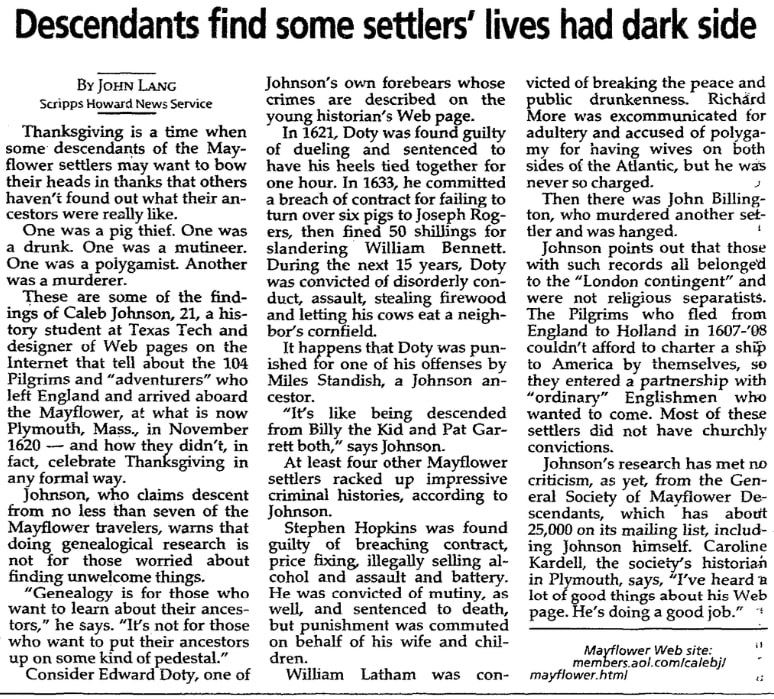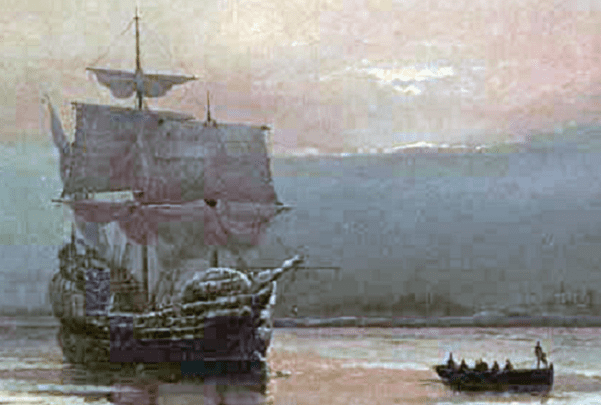Introduction: In this article – to celebrate November 21 being the 400th anniversary of the arrival of the Mayflower – Melissa Davenport Berry writes about some of the darker sides of the Mayflower passengers. Melissa is a genealogist who has a blog, AnceStory Archives, and a Facebook group, New England Family Genealogy and History.
When Mayflower historian Caleb Johnson was making his debut more than 20 years ago, his findings were published in the Milwaukee Journal Sentinel in 1997.

Johnson, a Mayflower descendant himself, was only 21 years old at the time – and his skilled sleuthing revealed some startling criminal histories among the Mayflower settlers, including polygamy, dueling, bootlegging, and pig stealing. The big scandal was murder, but I found a descendant who argued it down to manslaughter via his research.
The secrets buried under Plymouth Rock are not always a welcome discovery, but as Johnson told the press:
“Genealogy is for those who want to learn about their ancestors. It’s not for those who want to put their ancestors up on some kind of pedestal.”
A few examples from Johnson’s research:
“In 1621, [Edward] Doty was found guilty of dueling and sentenced to have his heels tied together for one hour. In 1633, he committed a breach of contract for failing to turn over six pigs to Joseph Rogers, then fined 50 shillings for slandering William Bennett. During the next 15 years, Doty was convicted of disorderly conduct, assault, stealing firewood and letting his cows eat a neighbor’s cornfield.”
In addition, Johnson cited other offenses committed by Mayflower passengers: Stephen Hopkins, selling alcohol, price fixing, and mutiny; William Latham, drunkenness; Richard More, polygamy; and John Billington, murder. (More coming on that in Part 2, next week.)
I found examples in GenealogyBank’s Historical Newspaper Archives of naughty Mayflower passengers and their descendants.
In 1929 Colonel Carl R. Gray, governor of the Nebraska Society of Mayflower Descendants, shared some dirt on Stephen Hopkins at a Society dinner.
The Omaha World-Herald reported that Gray stood up and told the tale of how his ancestor Stephen Hopkins “had been charged with being the first American profiteer.”
In 1945 the Chicago Sun featured the genealogy quest of Chester McNeil, who discovered his ancestral line traced to John Billington, the Mayflower passenger who was hanged for murder in Plymouth Colony in 1630.
McNeil needed to provide his credentials in order to establish “his right to membership in the Mayflower Society,” and went ahead, despite Billington’s infamy.
However, not all potential Society members could stomach the Billington blemish and jumped ship – what happened in Plymouth can stay in Plymouth!
(You can read more on the story of the Billington clan in my previous blog article: Mayflower’s Billington Brothers: America’s 1st Juvenile Delinquents?)
McNeil was not daunted, and went so far as to challenge the Plymouth records to wipe clean the blot on John Billington’s name:
Since the release of the 1997 Milwaukee Journal Sentinel article, Johnson has published books on the Mayflower lines and his website is enormously popular. If you want the whole skinny visit Caleb Johnson’s site at http://mayflowerhistory.com/
Related Articles:
